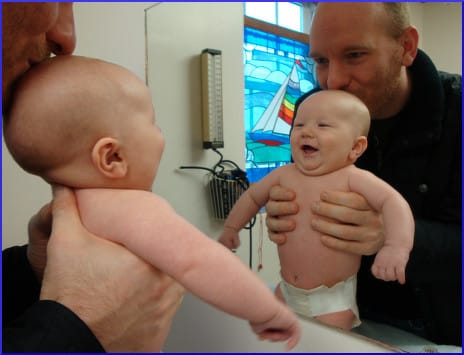 Motivational interviewing is one of the tools of choice in the childhood obesity field. Why? Dr. Martin T. Stein suggests that, in primary care settings, childhood obesity is relatively unresponsive to more customary interventions.
Motivational interviewing is one of the tools of choice in the childhood obesity field. Why? Dr. Martin T. Stein suggests that, in primary care settings, childhood obesity is relatively unresponsive to more customary interventions.
Doctors are urged to incorporate motivational interviewing of parents in their evaluation and treatment of obese children. Reviewers have characterized the data on the effectiveness of motivational interviewing in primary care as “impressive.” But what is it? Dr. Stein says:
Motivational interviewing (MI) is a method of communication that involves techniques of reflective listening, shared decision-making, encouraging autonomy, and dialogue leading to behavior change.
He discusses a particular study in which primary care providers and registered dietitians were trained to train parents. The results demonstrated that, over 2 years, commitment to a structured motivational interviewing training program could result in a “modest but significant reductions in BMI percentile.” The original narrative of that study, by Kenneth Resnicow, Ph.D., and a large number of co-authors, can be found in the March issue of Pediatrics.
The study looked at 42 practices working with the parents of children ages 2 to 8. Primary care physicians and registered dieticians were trained by a psychologist and by a supplementary DVD to work with families.
The participants were divided into three different groups. Some had “usual care,” which meant standard educational materials that were handed out during routine visits. Some had 4 motivational interviewing sessions delivered by the doctor, and some had the 4 doctor sessions plus 6 sessions with a registered dietician. These latter two groups received counseling that was directed toward creating motivation for changes in behavior, and the professionals acted in collaboration with the families to “set action-oriented goals around discrete behaviors.”
The study is important because it is among the first to show that when used in primary care practices, motivational interviewing can make a difference. The lead author also sets great store by the fact that the number of training sessions and the overall amount of training are pragmatically possible in the real world.
Entire careers have been spent in studying the nuances of motivational interviewing, but for the benefit of health care professionals who want to give it a try, Healthy Jacksonville Childhood Obesity Prevention Coalition has boiled down the essentials to one instructional page, subtitled “Tips for Successful Physician-Patient-Family Interactions.”
Source: “Motivational Interviewing for Childhood Obesity: A Strategy for Pediatricians,”
jwatch.org, 04/15/15
Source: “Motivational Interviewing and Dietary Counseling for Obesity in Primary Care: An RCT.” aappublications.org, 03/25/15
Source: “Primary Care Interventions for Pediatric Obesity: Need for an Integrated Approach,” Aappublications.org, April 2015
Source: “Motivational interviewing can positively impact childhood obesity,” ScienceCodex/com, 05/04/14
Source: “Motivational Interviewing,” hjcopc.org, 10/08/15
Image by eyeliam

 FAQs and Media Requests:
FAQs and Media Requests: 











